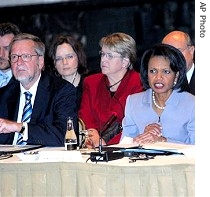2006年VOA标准英语-Rice Warns of Punitive Steps If Sudan Refuses U(在线收听)
By David Gollust
United Nations
23 September 2006
 Denmark's Foreign Minister Per Stig Moeller (left) and Condoleezza Rice |
||
-----
The meeting, which included among others U.N. Security Council member counties and Arab allies of Sudan, heard an appeal from Secretary Rice that time is running out for political action to head off a renewal of the kind of genocidal violence that ravaged Darfur two years ago.
The Sudanese government, citing threats to its sovereignty, has resisted compliance with a U.N. Security Council resolution approved last month that would replace the current seven thousand member African Union observer mission in Darfur with a full-scale U.N. peacekeeping mission three times as large.
In a talk with reporters after the Darfur meeting at a New York Hotel, Secretary Rice said no one intends to impinge on Sudan's sovereignty. But she said Sudan has not fulfilled its responsibility to protect the weakest in its society and so there will have to be a U.N. force.
Discussion at the U.N. of possible sanctions against Sudan, if it continues its defiance of the Darfur resolution, has made little headway. But without elaborating, Rice said there are various other measures available to punish Sudan, implicitly outside the United Nations framework. "There was a very clear indication by several speakers today that there are other measures at the disposal of the international community, should we not be able to get the agreement of Sudan in the way that we would like to get the agreement of Sudan, which is that they would accede to the desires of the international community to stop the violence and to stop the rape of women and children, and allow humanitarian workers to work," she said.
Rice cited a new report by U.N. human rights monitors accusing Sudan's army of bombing Darfur villages, and reporting a new outbreak of sexual violence against displaced persons, activity she said that simply cannot continue.
The co-chair of the meeting, Rice's Danish counterpart Per Stig Moeller, insisted that international pressure on Sudan can succeed despite Khartoum's adamant refusal thus far to accept the new force.
"It, of course, makes an impression (on Sudan) that every government, that all the world, is assembled in calling the situation unacceptable, the murders unacceptable. All countries in here find it unacceptable, Arab, African, Asian, European, America. This of course means something in Khartoum. Otherwise they will know that the world stands side-by-side to have other measures, if we cannot protect the people of Darfur through political means," he said.
Rice and Moeller said the same grouping would convene again next month to assess progress, if any, on the issue. Time pressure for the peacekeeping upgrade in Darfur eased somewhat earlier this week when the African Union agreed to keep its force in Darfur until the end of the year, extending a mandate that was to have ended September 30th.
The A.U. mission has been under-funded and lacks the mobility to patrol the entire Darfur region. The remote, arid western region has been torn by violence since early 2003, when Arab militiamen backed by the Sudanese military began waging a scorched-earth campaign against local Darfur rebels.
More than 200-thousand people have died as a result of the conflict and more than two-million others have been displaced. Violence has continued, and even increased in recent months, despite a Darfur peace accord reached in Nigeria in May.